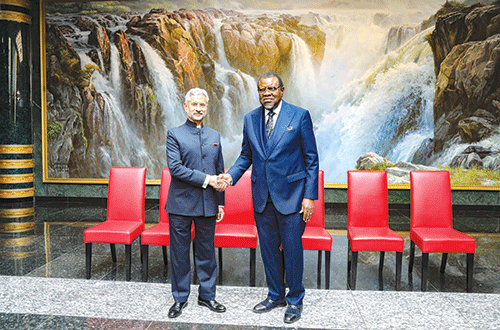President Hage Geingob yesterday said Namibia remains open for business to those who see the country as an attractive investment destination.
He made the remarks during a courtesy visit with the Indian government’s external affairs minister Subrahmanyam Jaishankar and his delegation.
The visit was aimed at strengthening bilateral relations between the two countries and exploring trade opportunities with public and private institutions in the areas of agriculture, transport and energy.
The President said Namibia went through the wringer in recent years, referring to the global economic downturn, followed by severe drought then the Covid-19 pandemic.
He, however, noted the future looks bright for Namibia due to its ambitions in the green hydrogen space and offshore oil discoveries.
“We are entering new levels of development, looking into green hydrogen and oil discoveries. We think our old friends like you, India, can also assist us with the know-how and technology since we come a long way.
There are also many areas that we can cooperate in,” said Geingob.
Namibia has the potential to become an energy hub.
In March, Namibia announced a third oil discovery in a year with partners Shell and QatarEnergy in the Jonker-1X deepwater exploration well in the Orange Basin offshore southern Namibia.
The Namibian government and Hyphen Hydrogen Energy last month agreed on a deal for the next phase of a US$10 billion green hydrogen project that will export to Europe once complete.
The plant, to be built in phases, will eventually produce two million tonnes of green ammonia a year for regional and global markets when it reaches full-scale output, which is anticipated before 2030.
Green hydrogen is made using renewable energy.
The mining sector remains one of the leading contributors to the local economy.
For the current financial year, growth is expected to be anchored by activities in the mining sector and tertiary industries as well as recovery in most sectors of the secondary industries.
Jaishankar is in Namibia on a three-day official visit, which concludes today. His visit follows the business delegation from India that was in the country last week to explore trade and investment opportunities in Namibia.
The delegation was hosted by the Namibia Investment Promotion and Development Board (NIPDB), the country’s lead agency responsible for investment attraction and promotion.
The meeting served as a platform for engaging in dialogue and the exploration of potential collaborative ventures.
Meanwhile, Jaishankar said the foundation that both countries share will take cooperation to a higher level.
“India, as one of the largest energy consumers, wishes to hold hands with Namibia in areas such as green hydrogen, oil and solar energy. I am pleased with
the business environment Namibia availed to many Indians doing business in Namibia,” noted Jaishankar.
That country’s fuel consumption rose 5% year on year in March, data from the oil ministry’s Petroleum Planning and Analysis Cell (PPAC) showed on Monday. Consumption totalled 20.50 million tonnes.
Furthermore, the Indian minister met with the Deputy Prime Minister and Minister of International Relations and Cooperation Netumbo Nandi-Ndaitwah earlier yesterday.
Nandi-Ndaitwah said historic bonds that were established during the liberation struggle between Namibia and India continue today, and are now focusing particularly on addressing the triple challenges of poverty, inequality and unemployment in the two countries.
“Challenges that have a domino effect, each challenge fuelling the other and leading to resentments that often devolve into violence and unrest.
The two countries’ cooperation grew from strength to strength with India’s wide-ranging support in our efforts to promote the socio-economic development of Namibia,” stated Nandi-Ndaitwah yesterday during the first session of India-Namibia joint ministerial commission in Windhoek.
Although some gains have been made in fighting income inequality in Namibia, the 11-member Business Rescue Task Force (BRTF) last year in its final report presented to President Geingob stated that a lot of work remains to be done in this regard.
As is the case with many countries in Africa, the BRTF said Namibia’s income inequality is rooted in the economic structure in which a few high-income sectors generate significant wealth, but only for a small number of people.
This, thus, leaves the vast majority of the workforce trapped in lower-income sectors in which they earn far less.
Apart from the first session, the two ministers jointly inaugurated the Centre of Excellence in Information Technology at the University of Science and Technology, which was established through support by the Indian government.
The centre aims to develop industry-oriented programmes and to conduct research to address the shortage of computing skills in cyber security, big data analytics and e-governance.
India has been providing training to Namibians in various areas, such as diplomacy, IT, health, education and agriculture.
“Our shared goal and vision is to see real change in our peoples’ livelihoods. We want to see our youth educated, trained and developed to become responsible citizens of our nations; we want to bring women into the fold so that they have full participation in our economies; we want to create sustainable jobs that ensure that our people are independent, self-sustained, enabled and empowered to take charge of their future and destiny,” she reiterated.
Nandi-Ndaitwah said Namibia would like to continue to cooperate with India in the fields of trade and investments, agriculture, capacity building and health, to raise bilateral relations to ever-higher levels.



